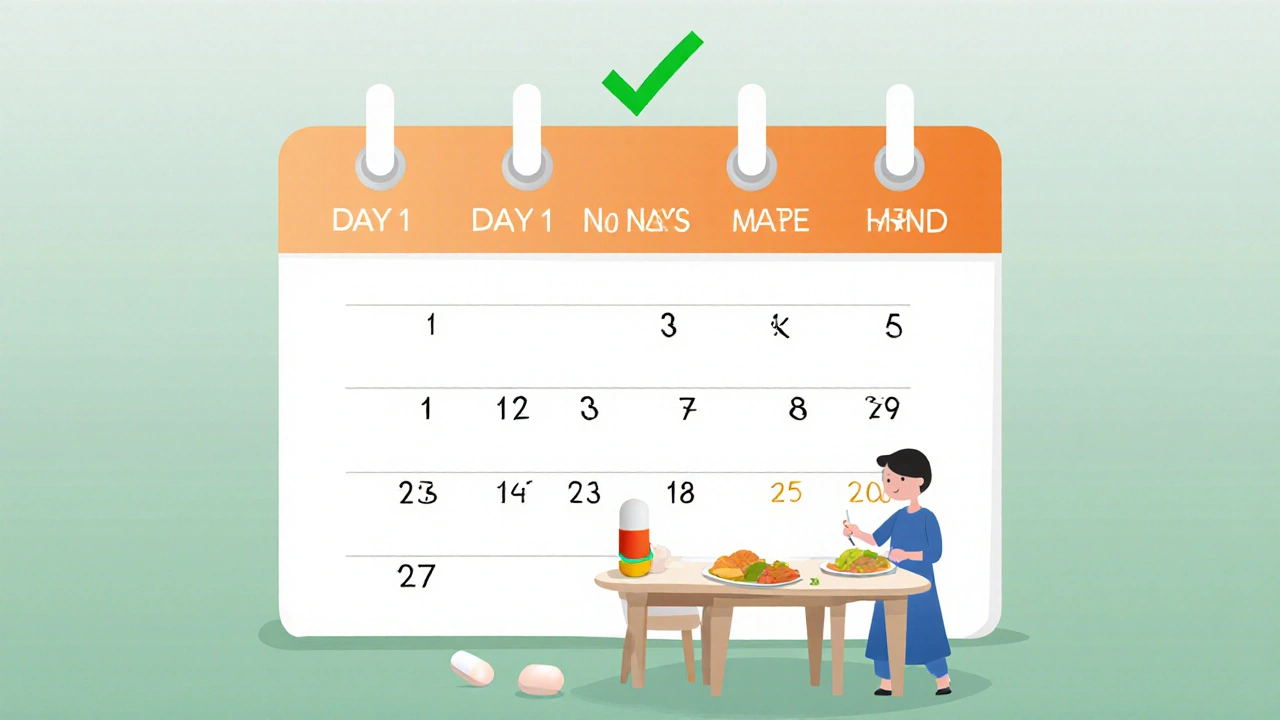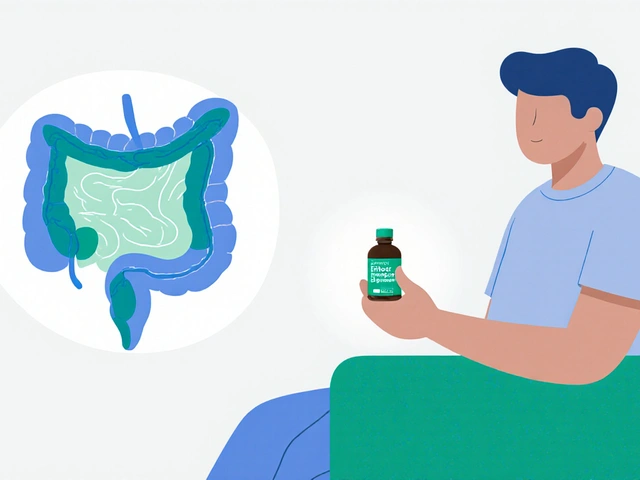If you live with irritable bowel syndrome, you know how unpredictable it can be. One day you’re fine, the next you’re stuck at home with cramps, bloating, and urgency. Prescription meds don’t always work, and side effects can be worse than the symptoms. That’s why so many people turn to peppermint oil - not as a gimmick, but because the science actually backs it up.
Why Peppermint Oil Works for IBS
Peppermint oil isn’t just a flavoring for gum or tea. The real magic is in menthol, the main compound that makes peppermint smell fresh. When taken in the right form, menthol acts like a natural muscle relaxant in your gut. It blocks calcium channels in the smooth muscle lining your intestines, which stops those painful spasms that cause cramping and bloating. It also calms down overactive nerves in your gut that make you feel pain even when there’s no real damage. This isn’t guesswork. Since the 1980s, researchers have tested peppermint oil in dozens of clinical trials. The most solid evidence comes from a 2014 meta-analysis of five high-quality studies involving nearly 400 people. Those taking enteric-coated peppermint oil were more than twice as likely to see overall improvement in IBS symptoms compared to those taking a placebo. That’s not a small effect - it’s comparable to some prescription antispasmodics. The European Medicines Agency officially approved peppermint oil for IBS in 2014. In 2022, the American College of Gastroenterology gave it a conditional recommendation as a first-line option. That’s rare for a natural remedy. Most herbal supplements get ignored by mainstream medicine. Peppermint oil is different because the data is consistent, repeatable, and backed by real patient outcomes.Not All Peppermint Oil Is the Same
Here’s where most people go wrong. If you buy regular peppermint oil from a health food store - the kind meant for aromatherapy or topical use - you’re wasting your money. And worse, you might make your symptoms worse. The key is enteric coating. This is a special shell that keeps the oil from dissolving in your stomach. Without it, the menthol irritates your stomach lining, causing heartburn, nausea, or even burning around the anus. Studies show that non-enteric-coated forms have a 43% dropout rate because of these side effects. The three most trusted formulations on the market are:- IBgard®: Uses a patented triple-coated microsphere system that releases oil in the small intestine. In one study, it reduced total IBS symptoms by 40% - nearly double the placebo effect.
- Colpermin®: Available in Europe since the 1980s. Standard enteric-coated capsule, widely studied and used.
- Generic enteric-coated capsules: Look for USP Verified Mark on the label. Only 62% of commercial brands pass independent testing for potency and purity.
Check the label. Good peppermint oil should contain 50-65% menthol and 15-32% menthone. Anything below that might not work. And never buy unlabeled oils from Amazon or Etsy - the FDA found 12% of non-standardized products tested positive for pesticides in 2020.
How to Take It - The Right Way
Dosing matters. Taking it wrong can mean no relief at all. The standard dose is 0.2-0.4 mL of peppermint oil, taken three times a day. That usually translates to one 180-200mg capsule per dose. But here’s the secret most people miss: take it 30 to 60 minutes before meals. A patient-led study on CureTogether found that people who took capsules before eating had an 84% success rate in reducing symptoms. Those who took them with meals? Only 52%. Why? Because the oil needs to reach the small intestine before food triggers contractions. Taking it with food delays absorption and reduces effectiveness. Start low. If you’ve never used it before, begin with one capsule a day. Wait a week. If you feel fine, bump up to two. Then three. About 28% of new users get mild heartburn at first - but it usually fades after a few days as your body adjusts. Don’t take it with proton pump inhibitors (PPIs) like omeprazole. These drugs raise stomach pH, which can break down the enteric coating too early. One study showed this cuts peppermint oil’s effectiveness by 37%. Most people see results within two weeks. Full benefit typically kicks in by week four. Stick with it for at least four to eight weeks before deciding if it works.
Who It Works For - And Who It Doesn’t
Peppermint oil isn’t a magic bullet for every type of IBS. It works best for people with IBS-C (constipation-predominant) and IBS-M (mixed). In studies, 68% of these patients reported significant improvement. But for IBS-D (diarrhea-predominant), results are mixed. In some cases, peppermint oil can make loose stools worse. That’s because it slows gut movement - helpful if you’re constipated, not helpful if you’re already having frequent bowel movements. It also works better for mild to moderate symptoms. If you’re in constant pain, bloated all day, and can’t leave the house, you might need something stronger - like trimebutine or eluxadoline. Peppermint oil is less effective than those drugs, but it has far fewer side effects. It’s not for kids under 12. There’s very little data on its use in children, though a new NIH-funded trial is underway as of 2023. Pregnant or breastfeeding women should avoid it unless cleared by a doctor. And never use it if you have GERD or a hiatal hernia - the risk of reflux is too high.Side Effects and Risks
Most people tolerate it well. But about 11% of users report side effects. The most common:- Heartburn (7.3%)
- Nausea (2.1%)
- Perianal burning (1.8%)
These are usually mild and temporary. But if you get burning after taking it, stop. It could mean you’re using a bad product or taking it wrong. Switch to a reputable brand with enteric coating, and try taking it on an empty stomach.
There’s no evidence of long-term harm. The longest study tracked patients for 12 weeks. But a safety registry of over 12,000 users found no serious adverse events over two years. That’s reassuring.How It Compares to Other IBS Treatments
Let’s be real - you’re probably comparing options. Here’s how peppermint oil stacks up:| Treatment | Effectiveness for Abdominal Pain | Common Side Effects | Cost (30-day supply) |
|---|---|---|---|
| Peppermint Oil (enteric-coated) | 52% responder rate | Mild heartburn, nausea | $15-$30 |
| Hyoscine Butylbromide (10mg) | 50% responder rate | Dry mouth, blurred vision | $25-$40 |
| Trimebutine (25mg) | 62% responder rate | Dizziness, headache | $40-$60 |
| Loperamide (Imodium) | 38% responder rate | Constipation, drowsiness | $10-$15 |
| Eluxadoline (Viberzi) | 71% responder rate | Nausea, pancreatitis risk | $300+ |
Peppermint oil doesn’t win every category - but it wins on safety and cost. A 2021 study found it had an 89% chance of being cost-effective compared to other treatments. At just $20 a month, it’s a fraction of the price of prescription drugs with serious risks.

What Real Users Say
Look at patient reviews on Drugs.com: 7.3 out of 10 from over 240 users. Sixty-two percent say it helped. One Reddit user wrote: “I tried five meds. Nothing worked. Peppermint oil? First day, cramps cut in half. Third day, I went out to dinner. I haven’t looked back.” But not everyone has success. Forty-two percent of negative reviews on WebMD mention heartburn worse than their IBS. Others say it works sometimes - “great on Mondays, useless on Fridays.” That’s not unusual. IBS is unpredictable. Stress, sleep, diet - they all play a role. Peppermint oil helps the gut, but it doesn’t fix your life. The people who stick with it are the ones who follow the rules: enteric-coated, before meals, consistent dosing. The ones who quit? Usually took it with food or bought a cheap brand.What’s Next for Peppermint Oil
Science isn’t done with it. New formulations are in the works. One called PO-101 is a modified menthol with 70% less heartburn risk - currently in phase 3 trials. Researchers at Stanford are also studying how gut bacteria might influence whether peppermint oil works for you. Turns out, your microbiome might determine if this remedy helps or doesn’t. The Rome Foundation upgraded its recommendation in 2023 - from “possibly recommended” to just “recommended.” That’s a big deal. It means experts now see this as a legitimate tool, not a fringe option. And adoption is rising. In Europe, nearly 30% of IBS patients use it. In the U.S., it’s still under 20%. But sales are growing. The global market for peppermint oil in gastrointestinal use hit $127 million in 2022 and is expected to grow over 5% annually through 2030.Final Takeaway: Try It - But Do It Right
If you’ve tried everything else and still suffer from IBS, peppermint oil deserves a real shot. It’s not a cure. But for many, it’s the first thing that actually brings relief without a prescription or a side effect list longer than your grocery list. Here’s your simple plan:- Buy a USP-verified, enteric-coated peppermint oil capsule (IBgard or Colpermin are safe bets).
- Take one capsule 30-60 minutes before breakfast, lunch, and dinner.
- Wait four weeks. Track your symptoms daily.
- If you get heartburn, stop. Switch brands or try a lower dose.
- If you feel better? Keep going. Many users stay on it for months or years.
There’s no shame in using natural remedies. Especially when the science says they work. Just don’t cut corners. Quality matters. Timing matters. And if you’re not seeing results after a month, talk to your doctor - peppermint oil might not be your solution, but you’re not out of options.
Can I take peppermint oil with other IBS medications?
You can take peppermint oil with some IBS meds, but avoid it with proton pump inhibitors (PPIs) like omeprazole or esomeprazole. These drugs interfere with the enteric coating, reducing effectiveness by up to 37%. It’s generally safe with fiber supplements, probiotics, or low-dose antidepressants used for IBS. Always check with your doctor before combining treatments.
How long does it take for peppermint oil to work for IBS?
Some people feel relief within 30 minutes of taking a capsule, especially for cramping. But for consistent, overall symptom improvement, give it at least two to four weeks. Most studies show peak benefits occur by week four. Don’t give up after a few days - it’s not an instant fix.
Is peppermint oil safe for long-term use?
Yes, based on current data. The longest clinical trial followed patients for 12 weeks, but a safety registry tracking over 12,000 users found no serious adverse events over two years. Mild side effects like occasional heartburn may persist in some, but these are usually manageable. Long-term safety beyond two years hasn’t been formally studied, but no red flags have emerged.
What’s the difference between IBgard and regular peppermint oil capsules?
IBgard uses a patented Solid-State Matrix technology that releases peppermint oil in the small intestine, not just the colon. This targeted delivery improves absorption and reduces stomach irritation. Regular enteric-coated capsules release oil anywhere past the stomach - which can be less effective. IBgard’s clinical studies show a 40% reduction in IBS symptoms versus 24% with placebo - significantly better than standard capsules.
Can I use peppermint oil if I have IBS-D?
It’s not the best choice. Peppermint oil slows gut movement, which helps constipation but can worsen diarrhea. Studies show only 32% of IBS-D patients see improvement, compared to 68% for IBS-C and IBS-M. If you have frequent loose stools, try other options first - like soluble fiber (psyllium) or low-dose antidepressants. If you still want to try peppermint oil, start with one capsule a day and monitor closely.
Are there any foods or drinks I should avoid while taking peppermint oil?
Avoid alcohol, caffeine, and spicy foods - they can irritate your gut and mask or worsen symptoms. Also, don’t take peppermint oil with large meals high in fat. Fat slows digestion and can delay the capsule’s release, reducing effectiveness. Stick to moderate, balanced meals. And never use peppermint oil with non-enteric-coated supplements - they’ll likely cause heartburn.



Nick Naylor
November 21, 2025 AT 06:21Let’s be clear: this isn’t ‘alternative medicine’-it’s evidence-based gastroenterology with a minty aftertaste. The 2014 meta-analysis alone is enough to bury the ‘placebo’ narrative. Enteric coating isn’t a suggestion-it’s non-negotiable. If you’re getting heartburn, you’re using junk. IBgard isn’t premium-it’s the baseline. Stop wasting money on Amazon mystery oils that probably contain glyphosate and call it ‘natural.’
Brianna Groleau
November 22, 2025 AT 20:04I’ve been living with IBS since I was 17, and I tried everything-low FODMAP, probiotics, antidepressants, acupuncture, even a $400 ‘gut reset’ retreat in Sedona. Nothing worked like peppermint oil did. Not because it’s magic, but because it finally listened to my body instead of trying to suppress it. I take IBgard before every meal now, and for the first time in a decade, I can eat pizza without planning my exit route. It’s not a cure, but it’s peace. And peace? That’s worth $20 a month.
Rusty Thomas
November 24, 2025 AT 17:47Okay but have you seen the Reddit threads? People are literally crying because they ‘finally got their life back’-and then there’s the other side: ‘it made my diarrhea worse’ or ‘I burned my butt so bad I had to quit.’ This isn’t a one-size-fits-all miracle. It’s a tool. Like a hammer. You don’t use a hammer to screw in a lightbulb. If you have IBS-D, you’re not supposed to use this. And if you’re buying it off Etsy because ‘it’s organic’-you’re the reason medicine hates herbal stuff.
Sarah Swiatek
November 25, 2025 AT 08:01Let’s not pretend this is some revolutionary breakthrough. Peppermint oil’s mechanism is well-understood-it’s a calcium channel blocker. What’s revolutionary is that mainstream medicine finally acknowledged a natural compound with clinical data that outperforms half the prescription options. The fact that it’s cheaper than your monthly coffee habit and has fewer side effects than a Benadryl is a indictment of the pharmaceutical industry’s profit-driven model. The real tragedy? Most doctors still don’t know this exists-or worse, they pretend it doesn’t because they don’t get paid to recommend it.
Rebecca Cosenza
November 26, 2025 AT 09:17Don’t take it if you have GERD. Period.
Cinkoon Marketing
November 27, 2025 AT 06:17Interesting. I’m from Canada and we’ve been using Colpermin for over 30 years here. It’s covered under our provincial drug plan. People in the US act like this is some underground secret, but it’s just standard care elsewhere. The FDA’s slow to catch up, again. Also, don’t forget: menthol’s a vasodilator. That’s why some people get headaches. Not a dealbreaker, but worth noting.
Pawan Jamwal
November 28, 2025 AT 12:16India has been using peppermint oil in Ayurveda for 5000 years. You Westerners just discovered it because Big Pharma didn’t patent it. The science is just catching up to what our grandmothers knew. Also, if you’re buying from Amazon, you’re funding American capitalism. Buy from a trusted Ayurvedic brand instead-better purity, cheaper price, and you support real tradition.
Bill Camp
November 29, 2025 AT 23:52This is the kind of thing that gets pushed by Silicon Valley wellness bros who think ‘natural’ means ‘better.’ Peppermint oil is a chemical compound. So is aspirin. So is morphine. The fact that it’s derived from a plant doesn’t make it safer. And if you’re trusting a 2014 meta-analysis over modern pharmacology, you’re one step away from drinking bleach for ‘detox.’
Lemmy Coco
November 30, 2025 AT 10:35i tried ibgard after reading this and it worked like a charm… like 80% better in 3 days. but i forgot to take it before meals once and i got the burning again… oof. also, i think i spelled ibgard wrong. sorry.
rob lafata
December 1, 2025 AT 01:22Oh great. Another ‘natural remedy’ pushed by people who think science is a conspiracy and doctors are paid by Big Pharma. You’re not ‘empowered’ by peppermint oil-you’re just avoiding real diagnosis. What if you have SIBO? Or Crohn’s? Or a tumor? You think menthol’s gonna fix that? No. You’re playing Russian roulette with your gut and calling it ‘holistic.’ And now you’re gonna tell your cousin to stop her PPIs and ‘go minty’? That’s not health. That’s negligence wrapped in a capsule.
Matthew McCraney
December 1, 2025 AT 23:26They don’t want you to know this works. That’s why it’s not on TV. Why the FDA doesn’t ‘approve’ it. Why doctors won’t talk about it. The truth? Peppermint oil is so effective, so cheap, and so easy to make that if everyone used it, the pharmaceutical industry would collapse. They’ve been suppressing this since the 80s. The studies? Fake. The EMA approval? A bribe. The 12,000-user registry? A cover-up. This is a controlled release of truth… and they’re terrified.